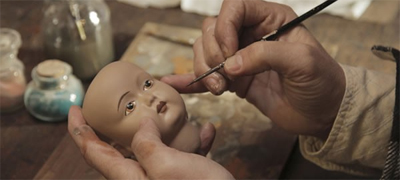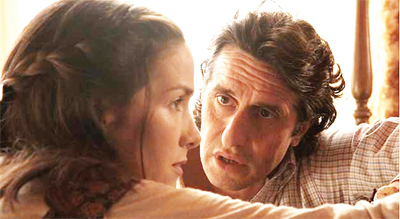This film was seen as part of the Jameson Dublin International Film Festival 2014.
Wakolda is a good old-fashioned pulpy pot boiler. The latest film from writer and director Lucia Puenzo, adapted from her own novel, is set in Argentina in 1960. Given the title, it’s easy enough to predict which direction Puenzo’s piece of historical fiction will be going. The history of the Nazis who sought refuge in South America following the Second World War is pretty compelling stuff, and Puenzo skilfully builds off this basic premise.
As much as popular history likes to paint the Second World War as an epic conflict of good against evil that neatly tidied itself up, there were lots of lingering threads – lots of loose ends dangling from the edge of this historical tapestry. The flight from justice, the protection that these people were afforded, and the desperate desire to bring these criminals to justice makes for a gripping pulpy narrative – but there’s also something more unsettling at work.
After all, acknowledging that the history of Nazi war criminals does not end after the signing of the German surrender means confronting the reality that such beliefs and philosophies cannot be vanquished with the stroke of a pen. Darkness still lurks in the wider world.
Wakolda takes its time getting where it wants to go. In structuring the film, Puenzo favours mood over story. The film spends a great deal of time establishing a foreboding atmosphere and defining its characters before descending into a good old-fashioned pulpy thriller. There’s nothing wrong with this, but it does mean that Wakolda seems to drift a little bit early in its runtime, before properly focusing itself.
That said, the mood is absolutely exquisite. Argentina is absolutely beautiful, and Puenzo captures that skilfully on screen. Wakolda drips with atmosphere – a palpable sense of discomfort and dread even before the movie’s time and place are linked with a stranger speaking German. Balancing the idyllic setting with a sense of claustrophobia and paranoia, Puenzo gives Wakolda a sense of weight even when very little is actually happening. There is very little that Puenzo can’t render well.
There are times when it seems like Wakolda is held together by Puenzo’s camera, with its decision to frame Àlex Brendemühl as a creepy villain long before his true nature is explicitly revealed. (Not that the opening credits leave much ambiguity.) Similarly, Puenzo seems to fixate on Elena Roger’s face for extended periods of time, casting her as a heroine under incredible pressure before the movie confirms that impression.
Puenzo’s directorial skill is so confident that the movie’s dialogue often feel superfluous. It’s hard not to pick up what is going on from the way that the director frames her characters and sets up her shots. There’s an elegant clarity of purpose to all this; paired with the raw beauty captured so clearly, it is very hard to resist Wakolda. It’s a moody, atmospheric piece – but it’s crafted with enough skill that it works beautifully.
At the same time, there’s a sense that the movie could do with a bit more focus. For all that Puenzo conveys everything that needs to be said, there’s a sense that many of the movie’s characters seem lodged at the periphery. In particular, despite the work that Puenzo does to define Elena Roger’s character, there’s still a sense that we know very little about her by the time the credits roll. In fact, she is reduced to something of a footnote. This can’t help but feel disappointing, as a more fleshed out character arc for Nora Eldoc could easily have carries its own film.
To be fair, there’s an endearing candour to Wakolda. As with any piece of fiction filling in historical blanks, there’s an ever-present fear that Puenzo might go too far – that she might drag the film into heightened melodrama or sensationalist nonsense. Instead, Wakolda is remarkably dignified. It keeps its eponymous character at a distance, which saves Puenzo from having to grant the character his own window on the narrative.
Shrewdly, the character is only glimpsed through the eyes of others; like blind men trying to describe an elephant. There are points where it seems like Wakolda might try to rationalise or justify or humanise this character; but the movie always pulls back. Asked why he does what he does, all the character can offer is some generic essentialism. “A poet writes poetry,” he offers. “A painter paints.” He does what it is in his nature to do. There is nothing more to it; no hint of redemption or decency in his conduct.
Wakolda also offers a pretty compelling insight into the culture that made it possible for such notorious Germans to disappear into South America. The local community is closed off and secretive, protecting and insulating itself. The uncomfortable past is literally and conveniently buried, so that those philosophies can fester in the shade, hidden from any eyes that might scrutinise their conduct. These little enclaves exist even in the most idyllic of settings, as much as people might like to believe that such unpleasantness has been banished from popular memory.
(In fact, Wakolda raises some delightfully uncomfortable questions about complicity, as these fugitives try to integrate themselves into the local community; try to buy and secure loyalty. These people are scientists and doctors; their knowledge saves lives and helps local livestock. One can see how these people could worm their way to the heart of a society that would want nothing to do with them. After all, there are ethical questions about how world governments should use the work of such despicable war criminals.)
Wakolda also features a corker of a third act, that easily redeems any of the difficulties in the early part of the film – as the noose tightens and all the different agendas come into play, while placing the title character in sharp contrast. Puenzo structures this climax absolutely beautifully, managing all manner of dramatic pay-offs without ever stumbling or losing momentum. It’s very powerful, very well-constructed stuff.
Wakolda is a fascinating piece of Argentinian cinema, and well worth a look.
All audience members are asked to rank films in the festival from 1 (worst) to 4 (best). In the interest of full and frank disclosure, here is my score: 3
Filed under: Non-Review Reviews | Tagged: Argentina, eugenics, film, germany, Guilt, Movie, nazis, non-review review, responsibility, review, second world war, the german doctor, wakolda |


























Leave a comment